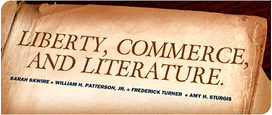I agree with Frederick Turner that “all is not lost.”
Let me offer a case in point. For several years, one of my standard lectures on the summer seminar circuit for the Institute for Humane Studies was called “Artistry Before Agenda.” During that talk I lamented the quality of so-called “libertarian speculative fiction,” pointing out that the same names every year won awards for works that preached to the choir and demonized persons of other ideological persuasions (imagine the pro-state central planner spending his free hours molesting children) without encouraging readers to think. How would this “movement” ever be more than a cottage industry? Who would be persuaded or challenged by such books?
I no longer give that talk.
Why? Organizations such as the Libertarian Futurist Society widened their nets and made concerted efforts to read and discuss and draw attention to a broader range of fiction. They invited into the conversation fellow travelers who, while not self-identifying as “libertarian,” are penning quality novels that clearly wrestle with relevant and thought-provoking issues about individual liberty, including markets.
Guess what? Some are good. Really good. Yes, of course, Sturgeon’s Law applies here, but it applies everywhere. What matters is the quality of the 10% that rises to the top. The quality here inspires hope. So, too, do new innovations in the industry, from the proliferation of small and medium-sized presses to the advent of e-publishing, which are making it possible for marginalized voices to find new avenues of expression.
If you consider this year’s finalists for the Prometheus Award for Best Novel, you’ll find a New York Times bestseller and a Kindle-only e-book publication, works written expressly for adults and works aimed at young readers. The result of this widening of the nets is multifold. For one thing, the authors from “outside the movement” are raising the artistic bar for some of the more complacent novelists who previously lived the life of big fish in the small pond of libertarian speculative fiction. More to the point, this shift highlights the fact that we who care about markets are not as alone as we thought, and there are others with different traditions and backgrounds and affiliations who nevertheless agree with us on some key points.
Perhaps most importantly, this intentional move has helped reach a larger audience in the name of liberty. When Cory Doctorow accepted the 2009 Prometheus Award for his novel Little Brother, his acceptance speech thrived on the ‘Net, finding its way to avid readers who were unfamiliar with the LFS, the Prometheus Awards, and perhaps even the term “libertarian” itself.
This encourages me.
The other half of the equation—finding and uniting informed, like-minded, and multi-disciplinary scholars willing to use the lens of markets to analyze literature in this and other genres—is the challenge to which Sarah Skwire rightly draws our attention.

